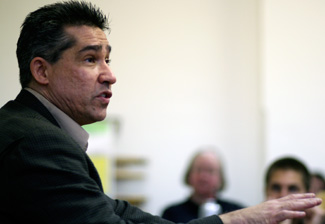"I never doubted that I would remain a Protestant," said Thursday evening's speaker Dr. Francis Beckwith, on his return to Catholicism. Beckwith received degrees from a number of institutions, most notably his Master's in Apologetics from Simon Greenleaf, his Master's and a Ph. D in Philosophy from Fordham University, and a law degree from Washington University in St. Louis. He is also the author of numerous books, including one which shares the title of the evening's talk: Return to Rome: Confessions of an Evangelical Catholic.
 Beckwith was sponsored by the men of the Wabash Conservative Union, and spoke about his irregular religious life. He was raised Catholic, converted to non-denominational Protestantism in his teens, and later rejoined the Catholic Church in 2007. Beckwith's wife became a first-time convert during his reconversion.
Beckwith was sponsored by the men of the Wabash Conservative Union, and spoke about his irregular religious life. He was raised Catholic, converted to non-denominational Protestantism in his teens, and later rejoined the Catholic Church in 2007. Beckwith's wife became a first-time convert during his reconversion.
The fact of Beckwith's reconversion, he admitted, wasn't itself strange. "It's not unusual for people to return to the Catholic Church," he said. It was the context of Beckwith's return, and the story behind it, which helped turn his book into a best seller. At the time of his reconversion, Beckwith was president of the Evangelical Theological Society (ETS).
Soon after Beckwith rejoined the Catholic Church, he gave up his presidency of the ETS. "I was never pressured to resign from the ETS," he said. "But within a week of my conversion, I resigned." Beckwith cited the negative attention he would have brought to the Gospel had he fought to remain president as a major reason for his resignation.
Despite something of a schism, Beckwith remained close to his Evangelical friends. "I still felt connected culturally to my Evangelical brothers," he said. "I think fighting would have changed that connection."
Anticipating criticism regarding why he even accepted the presidency, Beckwith related an anecdote. "It was only during my presidency that my wife and I thought about Catholicism," he said. "We prayed about it, and asked for a clear sign. Two years ago from this day [April 20th], my nephew called me and asked me to be his sponsor for Confirmation. You have to officially be in the Catholic Church to be a sponsor." It was a letter from Beckwith some time earlier which had convinced the nephew to go through Confirmation. "Eight days later, I stepped into confessional for the first time in 35 years."
 Returning to Beckwith's past reveals why he originally gave up his birth religion. Growing up in the environment of Las Vegas, where the "Charismatic Movement" had taken hold, was one major reason. The Charismatic Movement, now the second largest umbrella term in Christianity behind Roman Catholicism, holds above all that God works miracles in everyday life. However, there was a deeper catalyst in his abandonment of Catholicism. "The Parish my parents went to was theologically dead," Beckwith said. "My Catholic school theology class was taught by the school's basketball coach."
Returning to Beckwith's past reveals why he originally gave up his birth religion. Growing up in the environment of Las Vegas, where the "Charismatic Movement" had taken hold, was one major reason. The Charismatic Movement, now the second largest umbrella term in Christianity behind Roman Catholicism, holds above all that God works miracles in everyday life. However, there was a deeper catalyst in his abandonment of Catholicism. "The Parish my parents went to was theologically dead," Beckwith said. "My Catholic school theology class was taught by the school's basketball coach."
In any case, Beckwith became enthralled with Protestantism in general, and Evangelicalism in particular in his adolescence. "There was something deeply attractive about the Evangelical culture near my home," he said. "I was convinced that the Reformation was correct about a number of matters."
There were several Catholic doctrines that Beckwith took issue with, including those of penance, justification, apostolic succession, and real presence. "I thought the doctrines were un-biblical," he said. However, he continued to hold the Church in high regard, particularly its historical continuity and traditional orthodoxy.
"People began asking me why I wasn't Catholic," Beckwith said. "This question was the catalyst which began to make me question my Protestantism." Beckwith began to feel a return to Catholicism would be inevitable. "I had no justification to remain in schism," he said. "I had no grounds to not become Catholic."
Following his return, Beckwith's faith was changed in more than name only. "I started reading the Bible much more," he said. "I used to read the Bible looking for arguments. I now read and look for wisdom." He didn't entirely abandon his Evangelical persona, though. "I try to bring the energy and devotion to Christ I learned from the Evangelical church. One thing Evangelicals do really well is equip their people."
Sophomore Jacob Stump, while amused with Beckwith's speaking ability, felt the talk lacked a clear theological punch. "I thought one of Beckwith's most interesting comments was that all of Protestantism follows if you grant it one thing: its conception of grace as a one-time gift effected by Christ crucified," Stump said. "Despite how amusing his voice impersonations and anecdotal jokes were, it is too bad his talk did not focus more on these theological differences between Protestantism and Catholicism."
Photos by Stephen Abbott '09